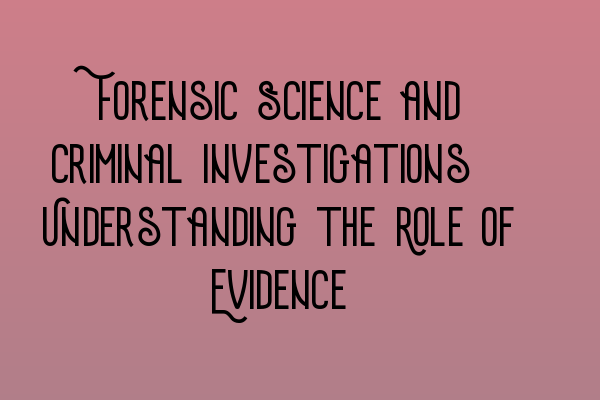Forensic Science and Criminal Investigations: Understanding the Role of Evidence
Forensic science plays a crucial role in criminal investigations, providing valuable evidence that can help uncover the truth and bring justice to the guilty. This field combines scientific analysis with legal principles to examine and interpret physical evidence in a systematic and objective manner.
At SQE Criminal Law & Practice Law UK, we understand the significance of forensic science in the criminal justice system. In this article, we will explore the role of evidence in criminal investigations and how forensic science helps in the process.
The Importance of Evidence in Criminal Investigations
Evidence is the foundation of any criminal investigation and legal case. It is the information and materials that support or refute a claim or allegation. Without proper evidence, it becomes challenging to establish guilt or innocence, leading to unjust outcomes.
Forensic science plays a vital role in gathering, analyzing, and interpreting evidence. It employs scientific techniques, such as DNA testing, fingerprint analysis, and ballistics examination, to link suspects, victims, and crime scenes. This objective and scientific approach bolsters the credibility of evidence and its admissibility in court.
The Role of Forensic Science in Criminal Investigations
Forensic science encompasses various disciplines that contribute to criminal investigations. Some common areas of forensic science include:
- DNA Analysis: DNA profiling is a powerful tool that helps identify individuals involved in a crime. By comparing DNA samples from the crime scene with those of suspects or victims, investigators can establish connections and potential involvement.
- Fingerprint Analysis: Fingerprints are unique to each individual, and their analysis is a valuable method for identifying suspects. Forensic experts meticulously analyze fingerprints found at crime scenes and compare them against a database.
- Ballistics Examination: Ballistics experts analyze firearms, bullets, and cartridge cases to determine their source and link them to specific crimes. This analysis can provide critical evidence regarding the type of weapon used and may help identify potential suspects.
- Forensic Pathology: Forensic pathologists examine deceased persons to determine the cause and manner of death. They conduct autopsies and collect evidence, such as injuries or toxicology reports, which can aid in identifying the perpetrator or establishing the circumstances surrounding a crime.
These are just a few examples of the many forensic disciplines utilized in criminal investigations. Each discipline focuses on a specific aspect of evidence analysis and contributes to the overall understanding of a crime.
The Process of Forensic Examination
Forensic examination follows a meticulous process to ensure accuracy and reliability. It typically involves the following steps:
- Collection of Evidence: Forensic experts carefully collect and preserve physical evidence from crime scenes. This includes photographs, DNA samples, fingerprints, weapons, or any other trace evidence that may be relevant to the case.
- Laboratory Analysis: The collected evidence is then taken to a forensic laboratory for analysis. Highly trained scientists use specialized equipment and techniques to examine the evidence and extract relevant information.
- Interpretation of Results: Once the analysis is complete, the forensic experts interpret the results based on their expertise and scientific knowledge. They compile detailed reports documenting their findings and conclusions.
- Expert Testimony: In court proceedings, forensic experts may be called upon to provide expert testimony. They explain the scientific principles and methodologies used in the examination and present their findings to the judge and jury.
By following this systematic approach, forensic science ensures that the evidence is analyzed objectively, allowing for fair and impartial judgments in criminal cases.
Conclusion
Forensic science is a critical component of criminal investigations, providing valuable evidence and expertise to uncover the truth. At SQE Criminal Law & Practice Law UK, we recognize the significance of forensic evidence in the legal process.
To learn more about criminal law and the legal profession, check out our related articles:
- Demystifying the Solicitors Qualifying Examination Format
- LLC Formation Made Simple: Step-by-Step Guide for UK Entrepreneurs
- Business Regulations in the UK: A Comprehensive Overview
- Preparing for the SQE Exam: Strategies and Resources for Success
- SQE Workshops and Webinars: Accelerate Your Exam Preparation
For more information about criminal law and our legal services, please contact SQE Criminal Law & Practice Law UK.
